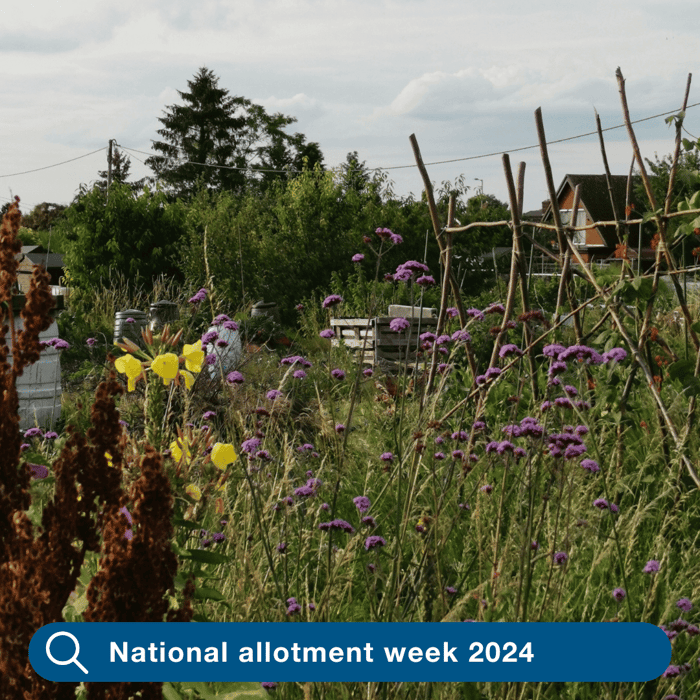
National Allotment Week 2024: Celebrating Biodiversity on UK Allotments
In this blog post:
- What is National Allotment Week?
- A Brief History of Allotments
- Celebrating Biodiversity on Allotments
- Pollinators and Wildlife
- Educating the Next Generation
- Eco-friendly Pest Control
- Companion Planting
- Soil Health
- The Future of Allotments
- Essential Tools for your Allotment
- Tiller & Cultivators
- Multi-Tools
National Allotment Week - 12-18th August
Hyundai Power Equipment is excited to join the celebration of National Allotment Week, which runs from 12th to 18th August 2024. This marks the 22nd year of this annual awareness campaign led by the National Allotment Society (NAS). This year's theme, "Celebrating Biodiversity on UK Allotments," highlights the vital role that allotments play in preserving and enhancing biodiversity across the UK.
What is National Allotment Week?
National Allotment Week is a yearly event dedicated to celebrating allotments—small plots of land rented by individuals from local councils or private associations for gardening, growing fruits and vegetables, or even keeping livestock. This week serves as a reminder of the many benefits allotments offer to our health, well-being, and the environment.
A Brief History of Allotments
The concept of growing your own produce is as old as time itself, but the modern allotment system began in the Victorian era. The General Enclosure Act of 1845 was a pivotal moment, making provisions for "field gardens" for the landless poor, although the amount of land allocated was initially small.
The First and Second World Wars saw a significant rise in allotment use as food shortages prompted the use of disused railway land, public parks, and private gardens for food production. In recent years, allotments have surged in popularity again due to growing awareness of sustainability, health, social benefits and the simple pleasure of growing your own! Today, allotments are more sought after than ever, with long waiting lists in many areas across the UK.
Celebrating Biodiversity on Allotments
Biodiversity is essential for maintaining healthy ecosystems, and allotments are ideal spaces to nurture and celebrate this.
Here are some ways you can encourage and promote biodiversity on your allotments:
Pollinators and Wildlife
Allotments are a haven for pollinators such as bees, butterflies, and birds, which play a vital role in pollinating crops. Planting a variety of flowering plants, letting some vegetables and plants go to flower and creating habitats like ponds or insect hotels can encourage more wildlife to visit and thrive on your allotment.
Educating the Next Generation
Teaching children about the importance of biodiversity and sustainable gardening practices ensures that future generations value and protect our natural environment. Involving kids in planting, composting, and observing wildlife can foster a lifelong love for gardening and conservation.
Maintaining biodiversity includes managing pests in a way that doesn't harm the environment. Eco-friendly pest control methods, such as introducing natural predators, using organic sprays, and implementing crop rotation, help protect the delicate balance of allotment ecosystems.
Companion Planting
Companion planting is the practice of growing certain plants together to enhance growth, deter pests, and improve yields. For example, planting marigolds alongside tomatoes can repel nematodes, while basil can enhance the flavor of the tomatoes.
Healthy soil is the foundation of a thriving allotment. Incorporating organic matter like compost or well-rotted manure improves soil structure and fertility, supporting diverse plant and microbial life. Using tillers to cultivate and prepare the soil a useful tool to maintain soil health. Crop rotation and cover cropping are also effective ways to maintain soil health.
With increasing demand and limited land availability, the future of allotments depends on innovative solutions. Urban gardening, vertical growing, and community gardens are some ways to address space constraints and involve more people in sustainable food production.
National Allotment Week 2024 is a wonderful opportunity to reflect on the importance of biodiversity in our gardens and allotments. Embracing sustainable practices and educating future generations is essential to ensure that these green spaces continue to flourish for years to come. Let's celebrate the incredible diversity of life that allotments support and work together to preserve these vital ecosystems.
Join us in celebrating National Allotment Week, send us your images, tips and advice of your allotment spaces!
A chainsaw is an excellent tool for allotment users, particularly when managing larger plots or those with mature trees and dense shrubs. It allows for efficient pruning, cutting down dead or overgrown trees, and trimming branches that may obstruct sunlight or encroach on growing areas. Additionally, a chainsaw is ideal for quickly preparing firewood or cutting logs for garden borders and other DIY projects on the allotment. .
A tiller, also known as a cultivator or rotovator, is an invaluable tool for allotment users because it significantly eases the process of preparing the soil for planting. With its rotating blades, a tiller efficiently breaks up compacted soil, mixes in organic matter, and eliminates weeds, creating a fertile and well-aerated environment for crops to thrive.

 Expert Advice and Aftersales
Expert Advice and Aftersales Free UK Delivery*
Free UK Delivery*

